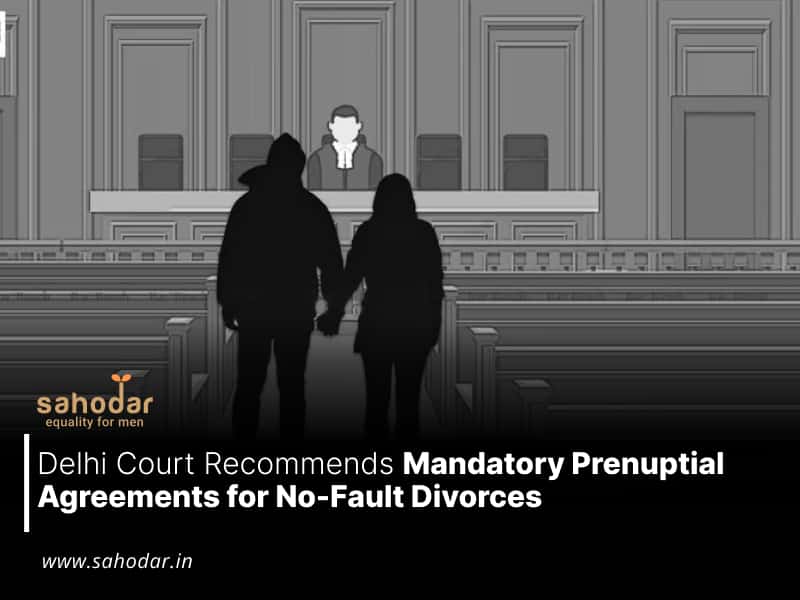The Court stressed that refusal to grant divorce would force parties to suffer further and would amount to “law-induced mental cruelty.”
In a recent judicial pronouncement, a Delhi court has recommended the imposition of a mandatory prerequisite for prenuptial agreements prior to matrimonial unions. This proposition aims to mitigate the psychological anguish endured by parties entangled in legal conflicts. The pronouncement was made by Family Court Judge Harish Kumar of the Patiala House Courts, during the adjudication of a no-fault divorce case involving a couple embroiled in protracted legal disputes spanning a period of seven years.
“Time has come to make compulsory prenuptial agreement to be executed before appointed authority after counseling of the parties about the possible risk of marriage going haywire for variety of reasons and making it mandatory to report breach every time breach occurs under intimation to the party allegedly at fault, making it further clear that if breach not reported he/she would not be heard later on that he/she did not report thinking that she/he would improve,” the Court said.
In a recent judicial pronouncement, a Delhi court has recommended the imposition of a mandatory prerequisite for prenuptial agreements prior to matrimonial unions. This proposition aims to mitigate the psychological anguish endured by parties entangled in legal conflicts. The pronouncement was made by Family Court Judge Harish Kumar of the Patiala House Courts, during the adjudication of a no-fault divorce case involving a couple embroiled in protracted legal disputes spanning a period of seven years.
“This Court, therefore, in the present case in the facts and circumstances as noted above, without going into question as who is at fault so as to allow husband’s or wife’s prayer for dissolution of their marriage on fault theory, hereby dissolve their marriage under Section 13B of the Hindu Marriage Act, 1955 taking their respective prayer to dissolve their marriage (based on the faults of other) as their respective consent to dissolve their marriage, from the date of decree to be drawn up following this judgement,” the Court said.
The Court duly acknowledged the pronounced escalation in matrimonial litigation in recent times, a substantial proportion of which lacks demonstrable instances of actual cruelty. Nonetheless, should one party opt for marital dissolution for any reason, their sole recourse lies in instituting legal proceedings and lodging allegations against the counterparty, as stipulated by the presiding judge.
“[These allegations] snowball into counter allegation and Court of law is pressed into service to find out something which never existed because difference of opinion and disagreements are also reported as an act of cruelty. Till such time real effort is made by the society as whole and the legislature in particular, temple of justice will keep on devising way to respond to the grave situation,” the Court added.
The litigant couple, whose matrimonial union commenced in 2011 and resulted in the birth of a child, expressed a shared desire for divorce. However, their inability to reach a consensus on key issues necessitated legal intervention.
Judge Kumar, in a judicious assessment of the case, determined that in circumstances marked by contentious matrimonial discord, grave allegations, and the irretrievable disintegration of the marital relationship, it would be inequitable to preclude the dissolution of the marriage.
The Court underscored that withholding a divorce in such circumstances, solely on the grounds that one party failed to establish the wrongdoing of the other, would constitute an unjust infliction of prolonged suffering upon the parties, irrespective of culpability.
The Court further emphasized that denying a divorce in such scenarios would result in the parties enduring mental distress due to legal proceedings.
Moreover, the Court acknowledged that this decision might be construed by some as an endeavor to evade the responsibility of meticulous evidentiary scrutiny during the adjudicatory process. Nevertheless, the judge expounded that the greater good of the state and society rests in the resolution of contentious claims, particularly within familial relations, to foster harmony and tranquillity.
“Spirit of the Family Court Act is also to bring out settlement between the parties, which means putting quietus to their dispute. In the present case if prayer of husband or wife is accepted holding the other spouse guilty of matrimonial offense, the person against whom findings would go will take the matter to higher forum thus drag the other into rigmarole of further round of litigation with added agony and harassment. Similarly, refusal of their respective prayer, if they failed to prove their allegation, would also lead to law induced mental cruelty as discussed above,” the Court explained further.
With respect to the matter of child custody, the Court has designated both parents as joint legal guardians for overseeing matters pertaining to their child’s schooling, educational pursuits, and extracurricular engagements. Furthermore, the mother has been mandated to effect the inclusion of the father’s name within the daughter’s school records.
Given the shared residential proximity of both parents within the Gurugram locality, the Court has granted the father the privilege of daily visitation and weekend overnight access to their daughter.
In the realm of financial support, the Court has decreed an equitable distribution of responsibilities, obligating both parents to contribute equally by shouldering 50% of the expenses associated with the upbringing and care of their daughter.

